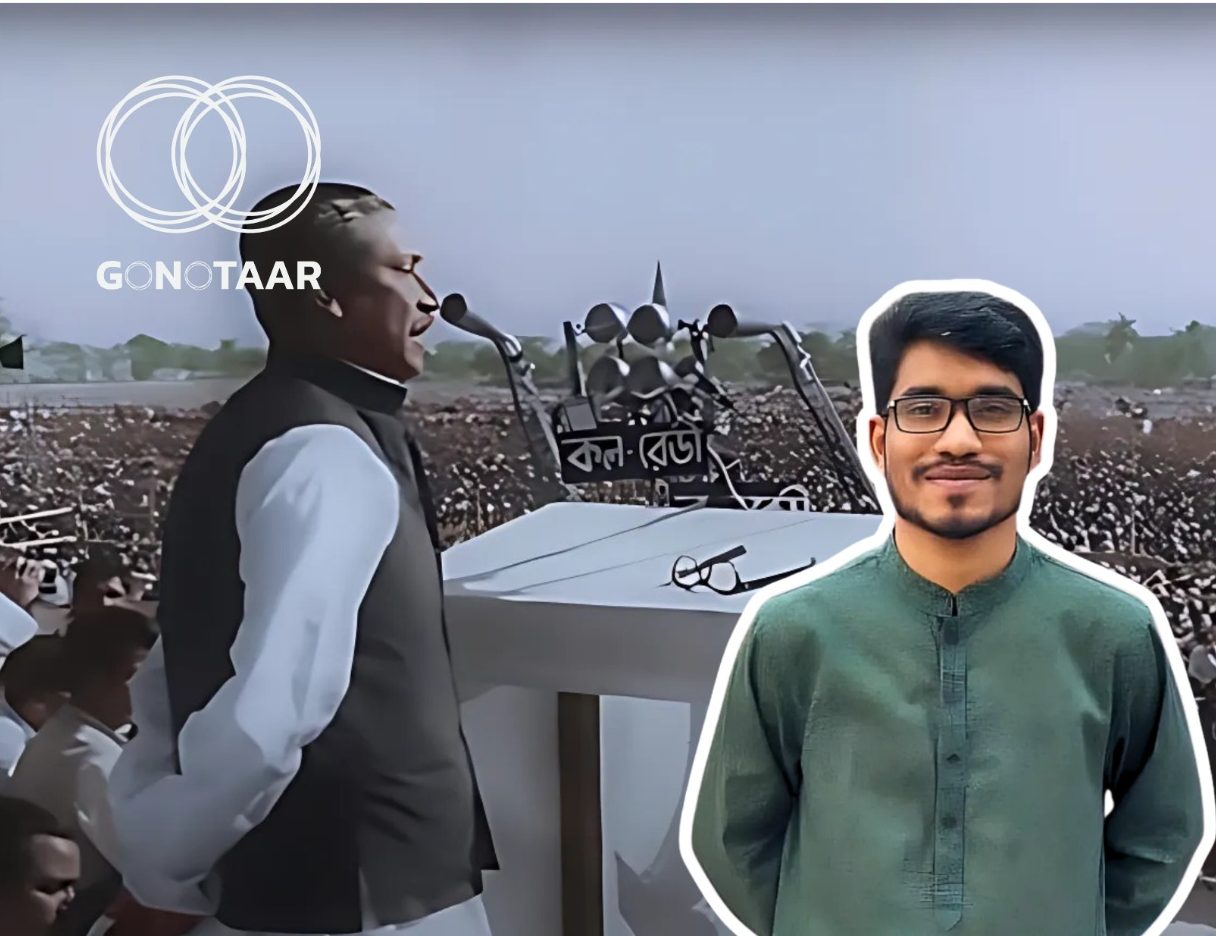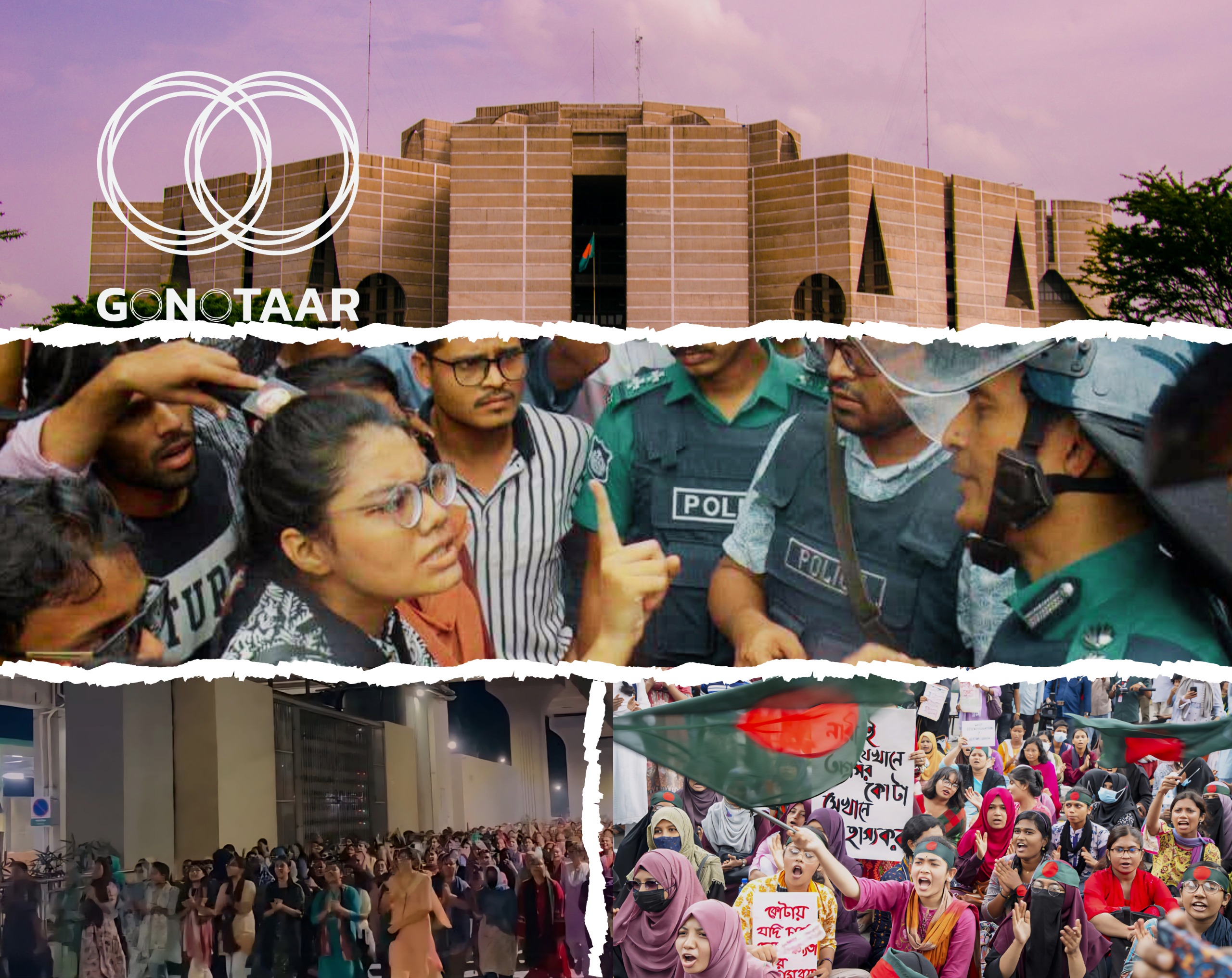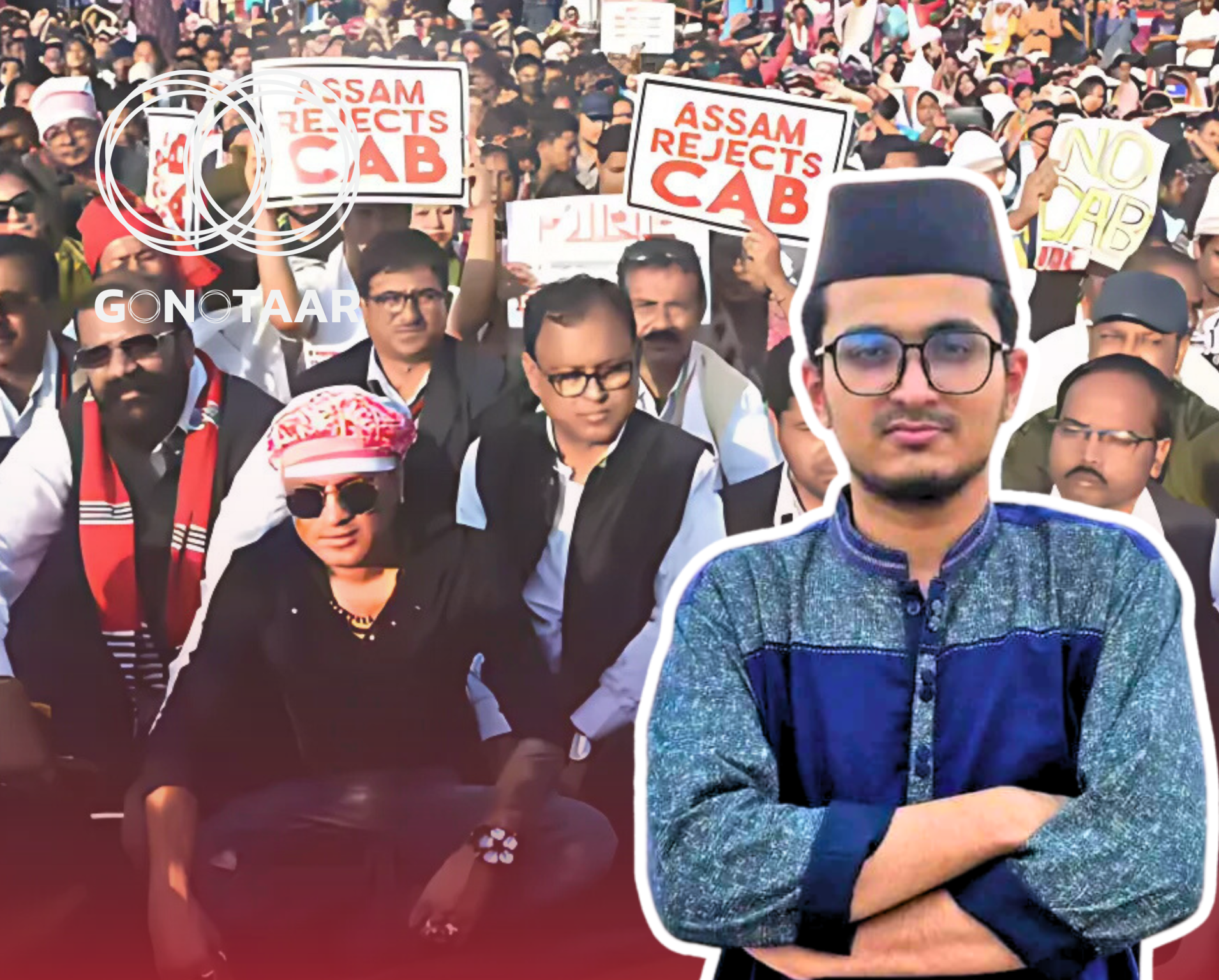Azad Hossen
Convener, Bangladesh Student Federation, University of Chittagong
Sheikh Mujibur Rahman will forever remain a tragic hero in the history of Bangladesh.
As a young man, Sheikh Mujib was influenced by the student wing of the Muslim League. He received his political education during his time in student politics. Initially, he was attracted to Suhrawardy and later, through Suhrawardy’s influence, to Jinnah. Even at a young age, involved in student politics, he understood that to free the farmers of East Bengal from the oppression of the upper-caste hindu landlords, there was no alternative but to follow Jinnah’s path. Consequently, he was very active in the Pakistan Movement. And it seems he retained an admiration for Jinnah until the end of his life.

Between Pakistan and Independence: The Dilemma
It’s worth noting that after the attainment of independence in ’47 and the establishment of Pakistan, Sheikh Mujib became quite confident. He had a certain sympathy for the people of this region getting their fair share under the new state. However, as a dedicated activist of the Pakistan Movement, he almost always had a deep ambivalence about splitting Pakistan. Even after the so-called ‘declaration of independence’ in the historic speech of March 7th, it doesn’t seem he wanted Pakistan to be divided.
From Bhashani to Suhrawardy: The Awami League Years
When Moulana Bhashani was forming the Awami League, Sheikh Mujib played an active role. Despite significant differences between Bhashani and Suhrawardy, Sheikh Mujib managed to bring his political mentor, Suhrawardy, into the United Front. The ideological and policy conflicts between Bhashani and Suhrawardy are well known, and this tension also affected the relationship between Bhashani and Mujib. Eventually, these conflicts led Bhashani to leave the Awami League entirely.

Some of Mujib’s supporters later romanticized a deep personal bond between him and Bhashan.But after the publication of Sheikh Mujib’s autobiography, it became clear that a cold war often simmered between them. Still, it seems Bhashani had a certain affectionate view of Sheikh Mujib. There is ample reason to doubt whether Sheikh Mujib would be in his current historical position had Bhashani not led the mass uprising of ’69 to free him and his associates. It is also claimed by Bhashani’s followers that by voluntarily abstaining from the ’70 election, Bhashani cleverly gave Sheikh Mujib the upper hand. Setting aside the debate of truth and falsehood, a holistic judgment shows the far-reaching consequences of these two events.
Charisma, Courtesy, and the Six Points
Sheikh Mujib, at least before the independence of Bangladesh, had courtesy and a knack for building relationships with ordinary people. When he declared the Six Points, the Awami League was not yet a large or dominant party, especially after the split with Bhashani and the decline of Suhrawardy’s political influence in East Bengal. At that time, Bhashani and the National Awami Party (NAP) were still the most important political force in the region. However, due to Sheikh Mujib’s manners and skill in gathering people, he managed to earn the trust of East Bengal’s civil society. While there was a strong inclination towards socialist revolution worldwide at the time, he pursued the politics of the bourgeois line, which our “authentic leftist” friends often ridiculed him for.
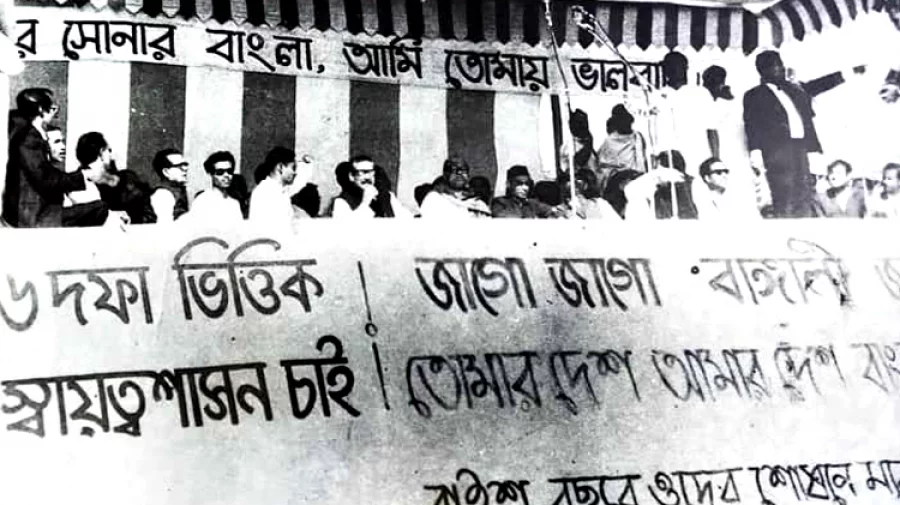
If you look closely, none of the Six Points were new proposals. Researchers like Professor Rehman Sobhan, Professor Nurul Islam, and Professor Anisur Rahman had, in their studies, explored the concept of exploitation and the two economies in East Bengal and suggested remedies to the best of their abilities. Sheikh Mujibur Rahman took all the concerns of civil society seriously and was in regular dialogue with them about these issues. He was also aware of the ongoing discourse since ’49-’50 regarding autonomy based on the Lahore Resolution and its constitutional form. He himself was preoccupied with these matters.
The Liberation Struggle
From the first independence in ’47 until ’71, he was directly or indirectly involved in almost every mass movement. Sometimes it was in the interest of the common people of East Bengal, and sometimes it was not.
But in the end, he could not refuse the call of history. Until ’71, he was actively involved in the struggles of the people of this region, despite his various limitations. And in ’71, through him, the aspirations of the people of this region found expression and became concrete. Whether he was able to carry the burden that history placed on his shoulders is certainly debatable. But there is no glory in denying that a large segment of this region’s population trusted him and responded to his call.
If we consider only this role, it will never be possible to erase Sheikh Mujibur Rahman from the history of Bangladesh. The way people of various classes and professions, especially the working class, sacrificed everything to plunge into war and secure victory even in his absence—to realize the dream he showed to the people of this region—is a rare example in world history.
Just as ’71 cannot be erased from the history of Bangladesh, neither can Sheikh Mujibur Rahman. And there is no need for it. Any nation moves towards the future by coming to terms with the unsightly events and misfortunes of its national history. It is justice to give everyone what they are owed.
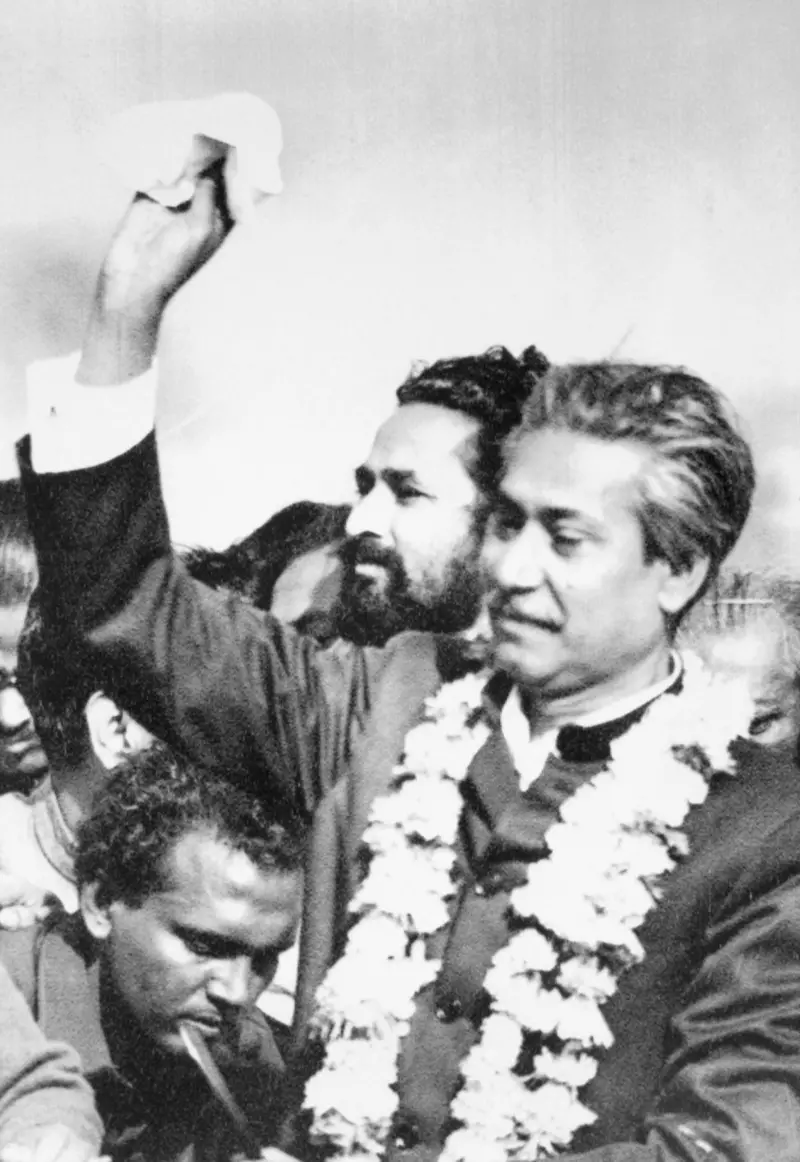
After 1971: The Missed Opportunity
The great victory of ’71 opened up a massive opportunity for Sheikh Mujib. If he had the preparation and willingness to seize that opportunity, he could have determined the future course of the Bangladesh state and been a successful hero in the history of Bangladesh. But his unclear understanding of the state project, his class-based pettiness, and the excessive sycophancy of the cunning jackals in lion’s skins who surrounded him prevented him from ascending to that position. He handed over the estate of the Bangladesh state to his family and followers. His family and followers ate it all up. The newly established state was not fully formed; a dignified nation was not built.
The goons of the League and their servile intellectuals try to hide their history of loot, pettiness, and intellectual bankruptcy by ascribing superhuman qualities to Sheikh Mujibur Rahman. They forget that Sheikh Mujib was a human being of flesh and blood, just like ten other people—he was not a deity. And in the failure of the nation-building project, their responsibility is no less than his. Because they are opportunists and intellectually bankrupt, they never admit this simple truth.

Beyond Myth: The Need for Critical Re-reading
In the past fifteen years, a lot of garbage has been composed in praise of Mujib. It is difficult to find the flesh-and-blood politician Sheikh Mujib in it. Nevertheless, we must seriously and critically re-read our history’s tragic hero, Sheikh Mujib. Opening many other doors, ‘July’ has also created an environment for a critical reading of Sheikh Mujib.
The life of Sheikh Mujibur Rahman is a great case study for those who want to do politics in this Bengali delta. Sheikh Mujibur Rahman is a great example of how a political leader from a backward region like East Bengal, despite many mistakes, gradually becomes the representative of a nation, and by learning from his mistakes and with his leadership qualities, becomes the central figure of the nation’s struggle for liberation and succeeds. On the other hand, it is of great importance to consider why this national leader, who was once sky-high in popularity, was killed along with his family in a military coup without the entire country uttering a single word. For the wise, there is surely a lesson in this.

